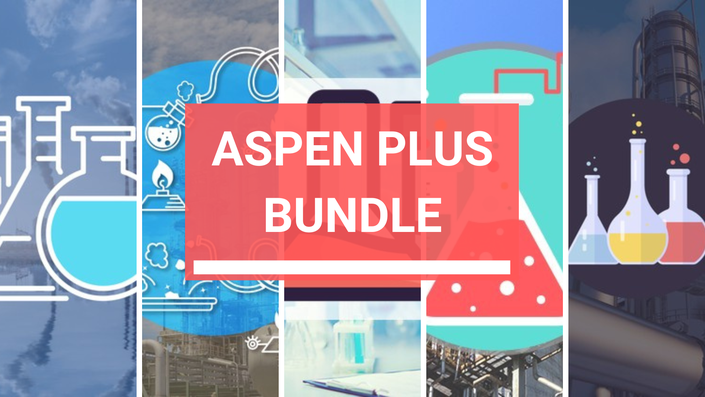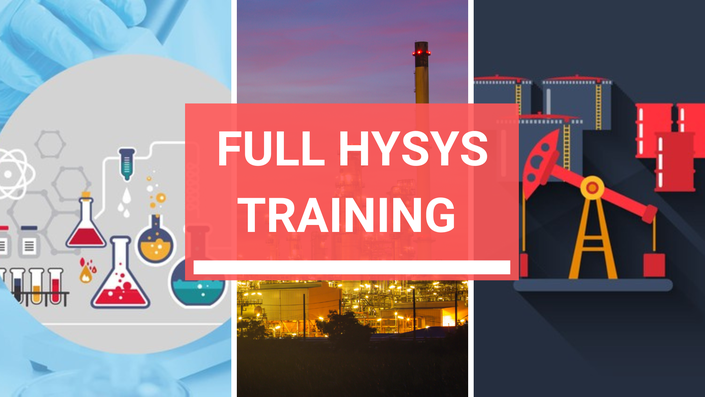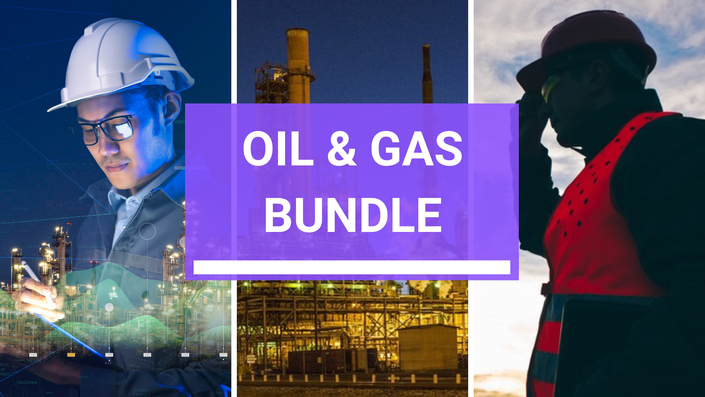Course Trailer
About this Course
📚 This Intermediate Course on Aspen Plus builds upon the basics and teaches you how to simulate more complex and realistic chemical processes, handle recycle loops, and integrate multiple unit operations efficiently.
You will simulate advanced process scenarios involving:
- Solving Process & Convergence Strategies
- Advanced Operations, such as Multi-stage Separation
- Advanced Reactors (Equilibrium & Kinetic)
- Sensitivity and Case Studies
👨🏫 Designed for
Engineers, graduate students, and professionals with a basic understanding of Aspen Plus who are looking to model complete processes and tackle real-world challenges.
📚 Course Approach
A hands-on, problem-solving approach with real industrial-inspired case studies and progressive learning modules.
🎯 By the end of the course, you will be able to:
- Build flowsheets with recycle and design specifications
- Simulate heat recovery networks and integrated energy systems
- Implement reaction kinetics and equilibrium data
- Analyze process sensitivity and conduct parametric studies
- Troubleshoot simulation errors and improve model robustness
🚀 Recommended for
Aspen Plus users with prior experience who want to simulate full chemical processes, including recycle loops and heat integration.
✅ You’ll learn to:
- Design and converge recycle systems using design specs and tear streams
- Configure and run kinetic and equilibrium reactor models
- Link unit operations across multiple flowsheet sections
- Perform case studies and optimization using built-in tools
- Use Aspen’s analysis utilities for mass and energy balances
- Validate model assumptions with engineering judgment

Self-Paced, Dynamic Lectures
Learn at your own pace, anytime and anywhere.
The lectures are concise, engaging, and focused—designed to maximize your understanding efficiently.

Example Title
Use this block to showcase testimonials, features, categories, or more. Each column has its own individual text field. You can also leave the text blank to have it display nothing and just showcase an image.

Evaluations, Quizzes
Evaluate your progress through interactive quizzes and self-assessments.
Reinforce key concepts, identify gaps, and ensure you're ready to apply what you've learned in real scenarios.

30 Day Money-Back Warranty
Enroll with confidence—if the course doesn’t meet your expectations, you can request a full refund within 30 days.
No questions asked.

Certificate of Completion
Receive an official certificate or diploma once you finish the course—perfect for showcasing your new skills on your resume, LinkedIn, or job applications.

Instructor Support
Get guidance whenever you need it—ask questions, request feedback, and interact directly with the instructor throughout the course.
Curriculum
- Welcome to the Course! (3:36)
- Course Content (11:03)
- Course Objectives (3:05)
- Requirements & Recommendations (2:24)
- Benefits of the Course (2:39)
- Material and Resources
- Join the Aspen Plus & HYSYS Forum (Unofficial) (1:27)
- Quick Review - Aspen Plus (9:23)
- Please be part of the discussion! (0:48)
- Navigation Panes, Folders and Forms (6:55)
- I really appreciate this!
- Flowsheet Manipulation Introduction (1:10)
- Flowsheet Modification (2A) (0:43)
- Flowsheet Options (1:35)
- Workshop: Explore Flowsheet Options (7:17)
- Scrolling&Typing too fast? (1:03)
- Viewing the Flowsheet (1:42)
- Workshop: Find Object (3:27)
- Workshop: Bookmark (3:53)
- Workshop: Pan (1:29)
- Modifying Flowsheet (2:41)
- Workshop: Connectivity (7:47)
- Workshop: Improving Appearance (9:45)
- Copy & Pasting in the Flowsheet (2:16)
- Workshop: Copy&Pasting in the Flowsheet (6:42)
- Locking the Flowsheet (2:23)
- Workshop: Locking Flowsheet / Screen (2:06)
- Flowsheet Sections (3:07)
- Flowsheet Annotations (3:56)
- Workshop: Flowsheet Annotations (10:46)
- Templates, Sub-flowsheets & Hierarchy (2B) (1:08)
- Templates (3:53)
- Workshop: Create, Save and Open Templates (3:30)
- Hierarchy Blocks (6:39)
- Workshop: Hierarchy Blocks (9:52)
- Flowsheet Manipulation Closure (1:08)
- Property Methods Introduction (2:30)
- Property Methods - Introduction (3A) (0:39)
- Why Property Method? (4:13)
- Ideal vs. Nonideal Modeling (2:34)
- Workshop: Ideal Property Method (4:44)
- Equation of State Models vs. Activity Models (4:13)
- Activity Coefficient Methods (6:45)
- NRTL Activity Model (6:22)
- UNIFAC Activity Model (3:12)
- Workshop: Activity Coefficient Methods (6:08)
- Equation of State Methods (4:18)
- Peng Robinson (PR) - EOS Model (2:14)
- Workshop: Equation of State Models (4:48)
- Introduction to Property Sets (3B) (0:58)
- Property Sets (4:15)
- Workshop: Defining your own Property Sets (4:58)
- Introduction to NIST TDE (3C) (0:59)
- What is NIST TDE? (7:48)
- Workshop: Retrieving Binary Data from NIST TDE (3:27)
- Take a break! (1:32)
- Introduction to Analysis Tools (3D) (1:24)
- Pure Component (2:48)
- Workshop: Single Point Analysis (2:20)
- Workshop: Multiple Point Analysis (3:25)
- Binary Analysis (1:48)
- T-xy Diagrams (1:39)
- Workshop: T-xy Diagrams (6:05)
- P-xy Diagrams (1:30)
- Workshop: P-xy Diagrams (4:11)
- Physical Property Environment Closure (2:02)
- More Unit Operations Introduction (3:35)
- Separators (4A) (0:42)
- Flash2 (1:30)
- Flash 3 (1:10)
- Decanter (0:54)
- Workshop: Decanter (3:22)
- Sep1 (1:27)
- Sep2 (1:29)
- Workshop: Using Sep1 and Sep2 (6:44)
- Heat Exchangers (4B) (0:35)
- Heater (1:00)
- Heat-X (Shortcut) (4:11)
- Heat-X – Rigorous Shell&Tube (4:54)
- Workshop: Heat-X (7:42)
- Heat Curves (0:48)
- Workshop: Heat Curves (4:39)
- More on Heat Exchanger - EDR (1:33)
- Columns (4C) (0:34)
- DSTWU (2:31)
- Workshop: DSTWU-1 Benzene & Toluene Min. Recycle Rate, Feed Tray, Compositions (6:54)
- Workshop: DSTWU-2 Analysis of the theoretical stages vs. reflux ratio (6:15)
- RadFrac (3:54)
- Workshop: RadFrac1 - Recycle Ratio of a C3-C4 Distillation (7:57)
- Workshop: RadFrac2 - C4-C7 Separation and Recoveyr of C4 (5:07)
- Workshop: RadFrac3 - Column Internals comparison of Trays vs.Packings (11:27)
- Absorber (1:26)
- Workshop: Absorber (Tray Column) (14:59)
- Extract (RadFrac) (2:29)
- Workshop: Extraction in a Ethylacetate-Acetone-Water system (5:24)
- More on Columns? (0:41)
- Reactors (4D) (1:14)
- R-Stoic (1:19)
- Workshop: R-Stoic For an Isothermal Reactor with Recycled Stream (8:21)
- R-Yield (1:17)
- R-Equil (2:09)
- Workshop: R-Equil for Isothermal Reactor using UNIFAC, UNIQUAC and IDEAL Models (6:10)
- R-Gibbs (2:43)
- Workshop: R-Gibbs - Competing Reactions (12:03)
- Workshop: R-Equil vs. R-Gibbs (7:49)
- R-CSTR (3:16)
- Workshop: R-CSTR1 - Isothermal (5:51)
- Workshop: R-CSTR2 - Adiabatic (9:37)
- R-Plug (3:02)
- Workshop: R-Plug1 – Adiabatic Liquid Reaction (8:31)
- Workshop: R-Plug2 – Isothermal Reaction (10:46)
- R-Batch (2:02)
- Workshop: Isothermal Batch Reactor (7:52)
- Workshop: Kinetic Reactors- Comparison (10:24)
- Need more Reactor Engineering? (0:54)
- Pressure Changers (4E) (0:41)
- Work Streams (1:22)
- Common Pressure Changers - Pumps (3:32)
- Workshop: Pumps & Turbines (3:39)
- Pump Performance Curves (2:17)
- Workshop: Pump Curves (Efficiency & Head Requirements) (5:15)
- Compressor (1:58)
- Valves (2:21)
- Workshop: Valves & Fittings (4:25)
- Pipes & Pipelines (4:54)
- Workshop Piping System Comparison: Schedules 40 & 80 vs Diameters 1in & 2in (8:51)
- Workshop: Rankine Cycle (9:02)
- Unit Operations Closure (1:53)
- Model Analysis Tools Introduction (3:53)
- Getting Results (5A) (0:30)
- Stream Results; Block Results & Results Summary (4:43)
- Workshop: Stream, Block & Summary Results (4:28)
- Adding T/P/M labels on flowsheet (4:38)
- Workshop: Adding T/P/F conditions (6:44)
- Adding Results Table (2:00)
- Workshop: Adding Table of Results (6:38)
- Plotting Data (5B) (1:33)
- Plotting Tool (4:32)
- Workshop: Column - RadFrac Plots (4:11)
- Workshop Plotting Data - PFR
- Design Spec (5C) (0:35)
- What are Manipulators? (1:51)
- Design Specification Tool (7:11)
- Converging Tips for Design Specification (5:35)
- WKS Design Spec 1 - RadFrac Reflux Ratio to meet Product Specification (6:09)
- WKS Design Specification 2 - R-Gibbs Reactor Yields (2:51)
- Workshop: Design Spec 3 - Modification of Diameter & Length for a PFR (4:55)
- Sensitivity Analysis (5D) (0:35)
- Sensitivity Analysis Tool (9:04)
- Methodology for Sensitivity Analysis (8:00)
- Plotting Sensitivity Analysis Results (1:26)
- Workshop Sensitivity Analysis based on Compressor and Heater of a Hydrocarbons (11:43)
- Workshop Sensitivity Analysis of Feed, Reflux Ratio & Pressure in a RadFrac (10:29)
- Workshop Sensitivity Analysis tools on an Adiabatic and Isothermal Reactor (9:10)
- Optimization & Constraints (5E) (1:09)
- Optimization Function (2:36)
- Workshop: Optimization of Product Yield in Equilibrium and Gibbs Reactor (7:03)
- Optimization with Constraints (1:54)
- Workshop: Optimization of a RadFrac Distillation Column (14:52)
- Model Analysis Tools Closure (2:09)
- Case Study Introduction (1:47)
- Case Study Goals (1:20)
- Case Study 1 - Hydroalkilation of Toluene - Problem Statement (6:48)
- Case Study 1 - Hydroalkilation of Toluene - Flowsheeting (26:53)
- Case Study 2 - Nitric Oxide Plant - Problem Statement (4:25)
- Case Study 2 - Nitric Oxide Plant - Flowsheeting (32:25)
- Case Study 3 - Isobuthene Production - Problem Statement (6:23)
- Case Study 3 - Isobuthene Production - Flowsheeting (40:43)
- Case Study Closure (1:38)
Course Enrollment
This and all other courses are available only via the All Courses - One Subscription Membership.

Hi, I’m Emmanuel Ortega,
a.k.a. the Chemical Engineering Guy!
With five years in the chemical industry, from petrochemical plant design to polyester textiles, I bring real-world experience to show the true value of engineering knowledge.
My Expertise:
- Process Simulation & Optimization
- Chemical Process Design
- Process Equipment Design
- Automotive & Industrial Polyester Yarn Technologies
- Online Tutoring, Online Education Management
The Courses I design are entirely dynamic. You will see theory and then apply it ASAP to a real life problem! I even use the books you are using right now in your engineering courses...
I'll see you in class!
Frequently Asked Questions (FAQ)
- When does the course start and finish?
- The course starts now and never ends! It is a completely self-paced online course - you decide when you start and when you finish.
- How long do I have access to the course?
- *How does lifetime access sound? After enrolling, you have unlimited access to this course for as long as you like - across any and all devices you own.
- NOTE*: This is true as long as you keep your subscription active.
- What if I am unhappy with the course?
- We would never want you to be unhappy! If you are unsatisfied with your purchase, contact us in the first 30 days and we will give you a full refund.
- Will I Get a Certificate/Diploma of Completion?
- Yes! After the course, you will get a Certificate of Completion with a Diploma! You can use this in your Resume!
- Are Resources Downloadable?
- Absolutely YES! Every resource is available for download, allowing you to study alongside them.
- Any doubt? Message me!
- Please reach out! [email protected]




